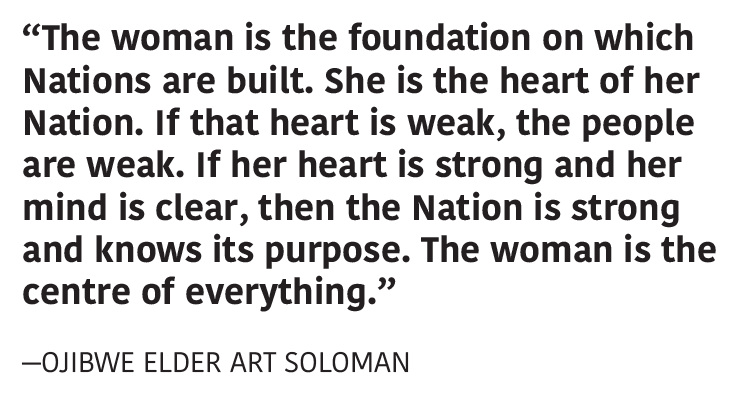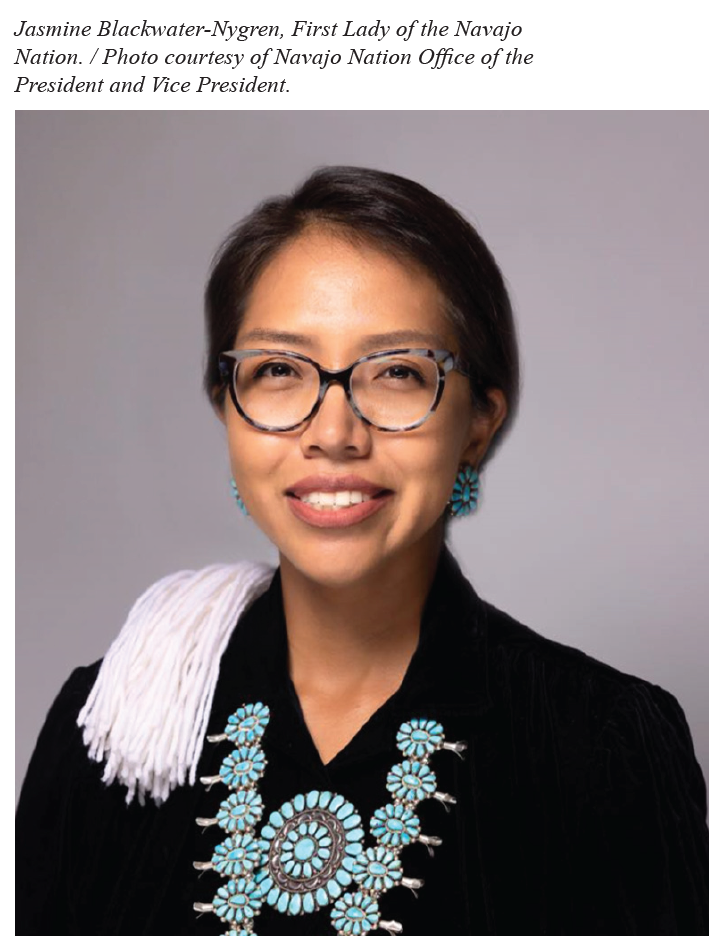First Lady of Navajo Nation’s Address at Not Invisible Act Commission Hearing
Yá’át’ééh (Greetings), shik’éí dóó shidine’é (my family, people and friends).
Good morning. My name is Jasmine Blackwater-Nygren. I am the First Lady of the Navajo Nation.
Thank you, Commissioners, Support Staff, Survivors, Families, & Advocates of MMIP, for the opportunity to speak with you here today at the Not Invisible Act Commission Hearing.
Many of you are dedicated to bringing our Indigenous relatives home and now commit your efforts to supporting the Not Invisible Act.
As we gathered yesterday and today, we remember all Stolen Sisters and Indigenous Peoples and commit to unite as one voice and community to fight for justice, promote survivor and family safety, and support healing.
I stand here this morning as a witness to many brave relatives who share their stories. It is within these stories that we find the brutal truth of a reality that has long gone unnoticed. Missing and Murdered Indigenous Peoples is an ongoing crisis that began with the start of colonialism. Many still believe colonialism is a relic of the past, but it is a system of oppression that continues to threaten Indigenous communities all across this country. However terrifying colonialism may be, it is countered by the resilience of our people. Resilience is not always about being strong or being able to remain on one’s two feet. Resilience is also about getting back up again even after being knocked down and to continuing to move forward. I am encouraged to see many relatives today who are resilient and have gathered to connect with one another and work together to solve the MMIP and Human Trafficking issues that affect Indigenous People both individually and collectively.
I commend the dedication of the Not Invisible Act Commissioners who have heard countless stories of pain and anger from across all of Indian Country. It is their work that will lead to the coordination of an improved intergovernmental response to counter the national crisis of missing, murdered, and human trafficked Indigenous people.
I also commend the survivors and families that have come before this commission to provide their testimony. Reliving the trauma, the pain, and the anger, is not at all easy. But it is with their bravery and resilience that we hear their truth. We can support them by attentively focusing on what is shared without judgement or pressure. We can support their need for safety by encouraging them that they are not alone. We can support them by assuring them their loss and pain will not be in vain. And most importantly, to let them know that they are loved.
You are loved.
The road to recovery remains traveled and “We Fight, We Resist, We Rise” against the endless fight for Indigenous justice by addressing the gaps and loopholes within the system that fails to keep our loved ones safe. However, I am encouraged by recent federal efforts to address the MMIP crisis like the 2022 reauthorization of the Violence Against Women Act which expanded the list of covered crimes, like sexual violence, sex trafficking and stalking, for which tribes can prosecute non-Indians. Or the enactment of Savanna’s Act, which clarifies federal, state, tribal and local law enforcement responsibilities with respect to missing and murdered Indigenous people and requires better data collection methods for MMIP cases.
I am especially encouraged by the efforts of Tribes across Indian Country taking the initiative to locally address MMIP and human trafficking. The Navajo Nation also has taken steps to educate, bring awareness, and respond to the crisis.
The Navajo Nation took action by creating:
- The Missing and Murdered Diné Relatives (MMDR) initiative, which has collectively supported to empower Navajo communities to promote prevention, awareness, and resources to recover missing Indigenous relatives and provide support to families of MMDR.
- Operation Rainbow Bridge was established by Navajo Nation President Buu Nygren to address reports of missing relatives who were suspected of being preyed upon by fraudulent rehabilitation centers and suspected human trafficking attempts. The aggressive on-the-ground response to finding missing relatives in Arizona have exposed many fraudulent homes, recovered many Navajo and other relative tribal members and connected them with legitimate and ongoing resources and reunification with families.
Although impactful our efforts may be, they are still not enough to prevail against the MMIP and human trafficking crisis facing Indigenous communities. To exercise resilience today, changes in federal, state, and tribal circumstances must happen. Tribal nations must be allowed to exercise greater authority of public safety programs that are not hindered by red tape. Consistent, effective, and expanded communication must take place between federal, state, and tribal agencies. And robust mandatory funding of tribal programs must be implemented immediately to swiftly address the national MMIP crisis. The first step to addressing the crisis is to acknowledge there is one, and today I am humbled that we gather to acknowledge this truth. Now we must take on the great responsibility of implementing action to make good on the words we speak today.
communities. To exercise resilience today, changes in federal, state, and tribal circumstances must happen. Tribal nations must be allowed to exercise greater authority of public safety programs that are not hindered by red tape. Consistent, effective, and expanded communication must take place between federal, state, and tribal agencies. And robust mandatory funding of tribal programs must be implemented immediately to swiftly address the national MMIP crisis. The first step to addressing the crisis is to acknowledge there is one, and today I am humbled that we gather to acknowledge this truth. Now we must take on the great responsibility of implementing action to make good on the words we speak today.
Ahéhee’ (Thank you).





